Alumni News
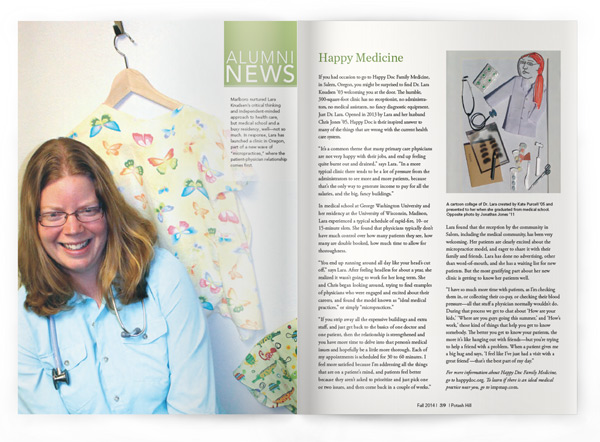
Marlboro nurtured Lara Knudsen’s critical thinking and independent-minded approach to health care, but medical school and a busy residency, well—not so much. In response, Lara has launched a clinic in Oregon, part of a new wave of “micropractices,” where the patient-physician relationship comes first.
If you had occasion to go to Happy Doc Family Medicine, in Salem, Oregon, you might be surprised to find Dr. Lara Knudsen ’03 welcoming you at the door. The humble, 300-square-foot clinic has no receptionist, no administrators, no medical assistants, no fancy diagnostic equipment. Just Dr. Lara. Opened in 2013 by Lara and her husband Chris Jones ’05, Happy Doc is their inspired answer to many of the things that are wrong with the current health care system.
“It’s a common theme that many primary care physicians are not very happy with their jobs, and end up feeling quite burnt out and drained,” says Lara. “In a more typical clinic there tends to be a lot of pressure from the administrators to see more and more patients, because that’s the only way to generate income to pay for all the salaries, and the big, fancy buildings.”
In medical school at George Washington University and her residency at the University of Wisconsin, Madison, Lara experienced a typical schedule of rapid-fire, 10- or 15-minute slots. She found that physicians typically don’t have much control over how many patients they see, how many are double booked, how much time to allow for thoroughness.
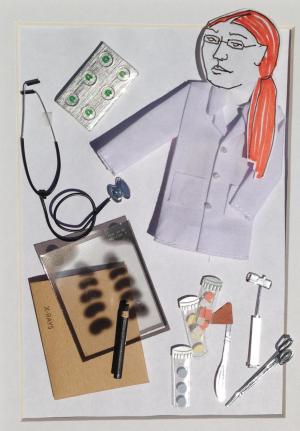
“You end up running around all day like your head’s cut off,” says Lara. After feeling headless for about a year, she realized it wasn’t going to work for her long term. She and Chris began looking around, trying to find examples of physicians who were engaged and excited about their careers, and found the model known as “ideal medical practices,” or simply “micropractices.”
“If you strip away all the expensive buildings and extra staff, and just get back to the basics of one doctor and one patient, then the relationship is strengthened and you have more time to delve into that person’s medical issues and hopefully be a little more thorough. Each of my appointments is scheduled for 30 to 60 minutes. I feel more satisfied because I’m addressing all the things that are on a patient’s mind, and patients feel better because they aren’t asked to prioritize and just pick one or two issues, and then come back in a couple of weeks.”
Lara found that the reception by the community in Salem, including the medical community, has been very welcoming. Her patients are clearly excited about the micropractice model, and eager to share it with their family and friends. Lara has done no advertising, other than word-of-mouth, and she has a waiting list for new patients. But the most gratifying part about her new clinic is getting to know her patients well.
“I have so much more time with patients, as I’m checking them in, or collecting their co-pay, or checking their blood pressure—all that stuff a physician normally wouldn’t do. During that process we get to chat about ‘How are your kids,’ ‘Where are you guys going this summer,’ and ‘How’s work,’ those kind of things that help you get to know somebody. The better you get to know your patients, the more it’s like hanging out with friends—but you’re trying to help a friend with a problem. When a patient gives me a big hug and says, ‘I feel like I’ve just had a visit with a great friend’—that’s the best part of my day.”
Get more information about Happy Doc Family Medicine. Learn if there is an ideal medical practice near you.
Class Notes
Class notes are listed by year and include both graduates and nongraduates; the latter are listed under the class with which they are associated.
’49
THOMAS DOWNS writes, “We now have four ‘great grands’—two boys and two girls. Still play golf and bridge.”
’51
“We are keeping our health and strength,” writes CHARLES STAPLES and his wife Joan. “We enjoyed a warm stay in Hawaii for two weeks.We saw much of cultural interest and history. I managed to get in some body surfing at Hanalei Beach in Kauai. Winter here in Chicago has been colder and tougher than any in my memory, and the cold trend stubbornly continues.We had a 12-day escape in Florida to see old friends and family in Februrary.” Charles was featured in a Chicago Reader article about the Chicago Cultural Center, a historic building he has been working to preserve, and document the preservation of, since 1965. Now that’s perseverance.
’52
R. BOYD THOMPSON reports, “My beloved wife Joanne died November 23— lung cancer, although she had not smoked for 42 years. I have visited with my roommate BRUCE BOHRMANN ’53 in Yarmouth, Maine. Good to see old friends. Say hi to John MacArthur for me. He is a great professor and helped me immensely.”
’57
REGINALD RODMAN writes, “Just published my book Seeing with the Heart and Soul.” The book, called “A well-written guide in reading the Bible,” is based on Reginald’s experiences as a preacher in various congregations.
’59
“Our college connection remains strong,” write BRUCE COLE and BARBARA DRAPER COLE. “Barbara helps in the bookstore occasionally and audits classes.We are fortunate to have biology professor Jamie Tanner and her family just up the hill in our log cabin. The apple trees still produce those huge apples beside Appletree. On-campus life is good—still cutting firewood and remembering the strong influence of life on the hill with faculty.”
’60
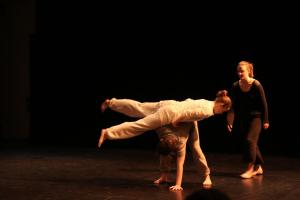
PENNY SAYRE WIEDERHOLD writes, “Wonderful appeal letter from John MacArthur. I still remember writing as fast as I could so I could get every note down before he erased the board.We’d meet at lunch, and we would go over any work. Best learning process ever.”
“I am almost as old as BRUCE COLE,” writes DAVID DECKER. “Had a nice exhibit reviewed in the Boston Globe. ‘The 3 Graces’ were modeled on Marlboro’s graceful ladies…our Marlboro summer’s musically terrific. South Pond, very refreshing. Cheers.”
’63
JONATHAN POTTER writes, “Still enjoying my teaching at University College at Rockland—currently working with history of theater; next semester I’ll be teaching acting skills. My recently published book on commedia dell’arte is doing well.” Jonathan was making plans for this summer’s commedia performance, Pantalone for Governor. “Hoping for a good cast turn-out.”
’64
“Marlboro remains one of the best things that has happened to me,” writes BUNKY ZIMMERMAN. “Love to everybody.”
JERRY BURNHAM writes, “At long last, my new CD Burnham Would has been released. You can listen and view details.”
’67
January found SUSAN WHITING, MAGGIE MARX ’70, JENNIE GREENE ’68, and JENNIE TUCKER in a VRBO home in Poipu, Kauai. “Great stories, good food, and a drink or two,” writes Soo.
JERRY BUZYNISKI writes, “After 12 years, I’ve finally published Enclosure—A Trappist Tale, which could possibly be read in English classes. Or ‘how not to write a novel.’ But…I did it.”
JENNIE TUCKER writes, “Spring has come to the Blue Mountains. Eating from the garden and looking forward to a trip to Boulder, Colorado, with my husband, to witness the wedding of ZARAH THOMPSON ’06.”
“The birds and wine of Chile and Argentina trip proceeded to move from the carmenere, cabernet, and merlots (red wines) of inland Chile to coastal wineries specializing in sauvignon blanc and chardonnay (white wines),” writes SUSAN WHITING in an article in the Vineyard Gazette. The article, titled “Days of Wine andWigeon,” also describes many exotic birds, of course, from white monjitas to red-tailed comet hummingbirds. The co-author of Vineyard Birds and Vineyard Birds II, Soo also reported bird sightings from Martha’s Vineyard.
’69
“I currently work at the Brattleboro Retreat, on the adult co-occurring unit,” writes TIMOTHY MAYO. “This is a detox unit for patients with substance abuse and addiction disorders and often with a co-occurring disorder such as depression, anxiety, mood disorder, and/or bipolar disorder.” Timothy had a poem published in the latest issue of Salamander magazine, called “Every Poet Needs a Brother.”
RICHARD COUTANT married local poet and recent honorary degree recipient Verandah Porche for a second time on May 3, 2014, in Guilford, Vermont. The couple’s first marriage, in 1979, lasted ten years, but their second union will last, they vowed, “for as long as we live, no matter what.”
In June, the Vermont Center for Photography honored the work of ROGER KATZ (deceased) with a retrospective of a hundred vintage gelatin silver prints, covering a span of time from the 1970s through 2012. The center says Roger “had a distinct ability to capture portraits on the street. His humble and quiet approach to his surroundings lent itself perfectly to acting as a ‘fly on the wall’ as life played out in front of him.”
Poetry in Marlboro: Cate Marvin ’93
In April, prize-winning poet Cate Marvin was visiting Marlboro as an outside evaluator (for Sarah Siebuhr ’14) when she was asked to include an impromptu poetry reading. Cate is the author of World’s Tallest Disaster and Fragment of the Head of a Queen, and professor of English at the College of Staten Island, City University of New York. Here is a poem from her third book, Oracle, forthcoming from W.W. Norton in March 2015 and printed with permission of the author. Photo by Rex Lott
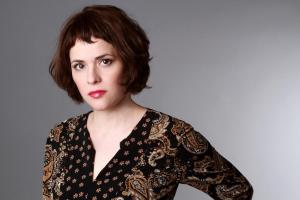 High School: Industrial Arts
High School: Industrial Arts
The lesson today is: someone always gets hurt.
Will it be you or another fool? This is a choice.
We provide the tools and materials. The saws,
the wood, nails, and supervision. Fall not now
in love, for it is merely a distraction from your
assignment. Now, create this uninspired name
plaque, build stacks of unstable shelves, lament
your lack of craft as the heat of your lust forms
in vaporous pools on the floor just below your
work table. You thought this class would mean
an easy credit. Welcome to our workhouse. No
one leaves this building whole. Consider now
how this building’s roof’s akin to the lid of a jar,
tightly screwed, and you’re the inhabitant within,
you’re scrabbling at its glass, yet we’ve punched
no holes in that aforementioned lid. Now, make
something! Make something no one can use that
no one wants. Don’t ask why. It builds character.
Someday you’ll look back on these days fondly.
Here are your goggles. There’s the eye-rinsing
station. No, this is not art! Ladies, stand back!
We don’t want you cutting those pretty fingers
off or sawing yourselves in half. This is a man’s
work. You, wipe that smirk off your face. Last
thing I need is one of you girls dying on my watch.
’70
PAMELA JORGENSEN HIGGINS writes, “We are still running an antique shop on Route 1 in Maine.We travel in the U.S. and England to find wonderful historic and beautiful pieces.” Have a look.
“All’s well,” writes CORNELIA CROCKER. “Enjoying life in Vermont, especially summer. Horseback riding is richly rewarding for me. Hello and hugs to all my college friends.”
’71
THOMAS TUCKER writes, “Climbing up on 35 years of teaching woodworking at the Catlin Good School, a feat I lay to the able mentoring of Gib Taylor and Edmund Ford, and to Frank Stout, whose keen eye informed my own. Had a great visit from FRED GRAY and Ray Huersy in mid-January. Vermont sounds, thankfully, much the same as I remember.”
FREDDY GRAY writes, “In March I got to sing the ‘St. Matthew Passion’ in Berlin at the Marienchor (thank you, Blanche Moyse, for the excellent training—I had no problem keeping up with the excellent German singers). In May, I had the great good fortune to dance in ‘du Printemps’ with Thierry Thieu Niang, who choreographed it last year in Paris to celebrate the 100th anniversary of the riotous premiere of Stravinsky’s ‘Le Sacre du Printemps.’ This year was a Vermont Performance Lab project, masterminded by impresarios SARA COFFEY ’90 and KATHERINE PARTINGTON ’09 (Diaghilev in Vermont?).”
Retired professor, published author, and hermeneutics expert DAVID KLEMM was on campus with his two sons in May as an outside examiner for MARK WU ’14. William Edelglass, professor of philosophy, and KIRSTIN EDELGLASS ’95 hosted an intimate gathering that evening at their home for interested students and others to hear from David, who was a student of Tibetan teacher Chögyam Trungpa in the ’70s. The group was riveted as he told one remarkable story after another about his experiences with Trungpa, Buddhism, meditation, Marlboro College, and life. It was an evening that no one fortunate enough to be there will ever forget.
’72
HAROLD ZAKON writes, “Lynne and I spent the summer working with colleagues at the University of Cambridge in the UK. We loved it. I was a visiting fellow at Cambridge’s oldest (out of 31) college, Peterhouse, founded in 1284. Now that’s what I call old school.”
PAUL SKLAR, writes, “My wife Amy and our boys Mason (12) and Daron (4) visited Marlboro this past winter to reminisce.We also started a little company with cell phone accessories we invented: cellhandle.com. Best regards to all.”
’73
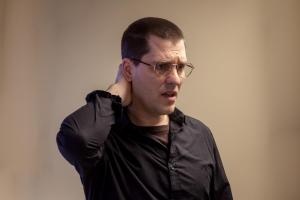
In the spring, MICHELLE CHASSE HOLZAPFEL shared in a joint show at the Fuller Craft Museum, in Brockton, Massachusetts. The show, titled “The Stories We Tell,” included work by Michelle, Tommy Simpson, and Binh Pho. Michelle also had a 35-year retrospective in the Barstow Gallery, titled “What’s at Hand: Nature, Nurture, Culture, Chance.”
’74
COLIN NICKERSON is a correspondent for the Boston Globe, covering science, after 26 years as a foreign correspondent for the Globe in Africa, the Far East, South Asia, Canada, the Middle East, and Europe.
’76
“Very busy these days,” writes MARTIN ROSENBERG. He was a visiting fellow in art and cognition through the Center for Transformative Media at Parsons The New School for Design. Martin gave a talk there in December titled “What Is at Stake with the Ergonomics of Guitar Design: Fretboard Cognition, Embodiment, and Collective Intelligence,” the subject of a recent short book. “I also have a longer study of jazz and cognition I’m trying to finish for spring,” says Martin. “I love to hear news from the Marlboro community.” He is married to Elizabeth Mazur, associate professor of psychology at Penn State Greater Allegheny, and has three kids: Annie (29) in New York City, Gabriel (19) at Wesleyan University, and Maya (16) at Mount Lebanon High School.
MELISSA METTLER ABRAMS writes, “Our younger daughter, Cece, is leaving to go to San Diego for her first year of college in August. Our older daughter, Haley, is still at the School of the Art Institute of Chicago for another two years. So, we will be empty nesters, very different after 21 years of raising two daughters. I have loved having children at home.We are now north of Denver, if old friends want to visit. Just turned 60, yikes.”
’77
LAURA LAWSON TUCKER writes, “Who would have guessed that the theater program I started—with others in Brattleboro—would be alive and well 10 years later. Theatre Adventure of NEYT (New England Youth Theater). Check us out!”
RACHEL EUGSTER’s picture book, The Pocket Mommy (Random House), received a Great Books 2014 award from the Canadian Toy Testing Council, and was named to the 2014 Best Books for Kids & Teens list by the Canadian Children’s Book Centre.
LINDY WHITON writes, “After 40 years in education and after trying to find work for almost two years, I decided being out of work was a sign for me to do what I’ve always really wanted to do: write, photograph, and help other ‘original mothers.’ I am writing a book called The Strength to Speak; The Courage to Say Goodbye, a photojournal-styled book on women who relinquished babies to adoption. I am very excited about it and hope to interview and photograph 15 biological moms whose stories are begging to be heard. I am looking for a cross-section of women from many different areas with many different experiences of relinquishing their babies and learning to live with their decisions. At this point I am trying to raise money to complete the project. This summer I will write up two of the interviews in order to have models to help fundraise, and I am holding a fundraiser in early August. This project has been very challenging and a real learning opportunity. I’m really enjoying it. I have had two op-eds in Vermont Views online magazine; I will have an article in The Hampshire Gazette out of Northampton, Massachusetts. And I will be writing a twice-a-month column for Vermont Views. I’m happier than I’ve been in many years. This is partially due to the incredible show of support my fellow alumni have shown me. All of my friends and family have been huge helps, and I feel blessed.”
SUNNY TAPPAN traveled to Homer, Alaska, where she surprised DEBORAH MEADOWS ’12, who she knew was working at the bakery owned by MAYA ROHR ’15’s mom. Sunny didn’t go all the way to Alaska just to do that, but it was worth it all the same.
’79
“Greetings from America’s hometown,” writes PETER DUDENSING. “If you ever find yourself at Plymouth Rock, please walk up the hill and come say hello.”
’80
SOPHIE CABOT BLACK recently published her third book, The Exchange, and has had four of her poems in The New Yorker, reports her mother, Linda.
’81
“I’m glad Marlboro is still out there, teaching people to think, and to write— both attributes seem to be in short supply these days,” writes DONALD SAWABINI. “I’m still here inWisconsin, still working with the lovely children and talented staff at Preschool of the Arts in Madison (18 years now), still married to my talented wife, Sheila.Wisconsin is beautiful, even if the political situation here is crap. I miss the green hills, brooks, and country roads of Vermont though. Hope all are well there.”
’86
DAVID DEACON writes, “I married Michelle Osborne in Camillus, New York, June 27, 2014.We are living near Syracuse University with our beautiful dog, Dahlia. I’m adjuncting at a couple of colleges and playing lots of old-time and Irish music.”
Project Atlantic: Mike Auerbach ’97
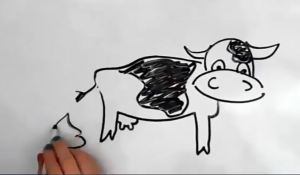 For their culminating project, students in Mike Auerbach’s Environmental Science and Policy course at Brattleboro Union High School took on the future of energy. Project Atlantic, a collaboration between the Brattleboro Town Energy Committee and Brattleboro-area students, aims to educate the public on its future energy options, using European nations as an example. Based on what they have learned, the students designed a documentary that gives the public information about the latest breakthroughs in renewable energy and energy efficiency, with examples from around the world and around the corner.
For their culminating project, students in Mike Auerbach’s Environmental Science and Policy course at Brattleboro Union High School took on the future of energy. Project Atlantic, a collaboration between the Brattleboro Town Energy Committee and Brattleboro-area students, aims to educate the public on its future energy options, using European nations as an example. Based on what they have learned, the students designed a documentary that gives the public information about the latest breakthroughs in renewable energy and energy efficiency, with examples from around the world and around the corner.
“Their model of local energy investigation, coupled with the creation of media to educate town members, is very important, and we are pushing for this to become a regional if not national model,” says Mike. “Nobody is doing this.”
The students, who received Marlboro College credit through theWindham Regional Collegiate High School, unveiled Project Atlantic at the Slow Living Summit on June 5 at the Marlboro College Graduate Center. They presented short films on topics like biogas, district heat, institutional building efficiency, wind and solar, geothermal, and new nuclear technology, woven together by a “news desk” narrative.
“My students have been asked to present at three regional energy conferences, and we are planning to hold trainings in the four surrounding school districts and across New England to show other towns how to engage their students in this type of work,” says Mike.
’90
SOPHIE LAMPARD DENNIS writes, “My son, Eric Dennis ’14, just finished at Marlboro, having focused on ecology with a Plan of Concentration on mycorrhizal fungi and island biogeography with Jenny, and metal-welding sculpture with Tim. I have been impressed with the academic expectations and rigor of Eric’s work, and was a proud mom when he was awarded the Bob Engel Award in 2013 for his work in natural science. As for myself, I have just completed 15 years of teaching at Landmark College, where I am an associate professor. In recent years, I have been active presenting nationally and internationally, conducting workshops, and publishing. I write and present mainly about pedagogical issues related to working with at-risk college students, for whom there may exist various barriers to learning. You can find my articles online and at my Linkedin page. My most recent work can be found in the journals The Teaching Professor (May 2014) and About Campus (Jan/Feb 2014). My daughter, Coral, is halfway through her Ph.D. in dairy science at the University of Alberta, Canada, and my youngest, Marie, attends the Community College of Vermont. My husband, Dan, remains busy with carpentry, while I am a justice of the peace in Marlboro.”
KATHY FRASER writes, “Tyce and I continue to advocate for trail access.We no longer run the tour company, though any alum out this way who is up for a spin in the Redwoods is welcome to look us up. I’m teaching full time now, and have a K-2 classroom at our tiny, rural school out in the hills. ‘Independent schools for independent minds’ is our motto, and some truly unique, creative, self-motivated people have come through this shoestring operation in its 40+ years. I love the ages I work with and the freedom I have with the curriculum. Still, looking forward to summer, as usual, to get back at the multitude of homestead chores that continue to mount. Our daughter, Maddy, is a second-year at the early-college prep academy about 90 minutes north of here. Carol Hendrickson and John Hayes, you may be pleased to hear I’m finally putting my degree to appropriate use and building a (semi-) subterranean structure: our root cellar/outbuilding will hold our solar system gear and sport a sod roof.”
“We recently moved closer to the beach, and live in Santa Monica now,” writes THERESE TINLING STEPHANO. “I love my work as a clinical supervisor at a community-based mental health agency. I supervise a team of therapists and social workers who assist low-income families. We specialize in trauma-related symptoms, pre-psychotic symptoms, anxiety disorders, mood disorders, and ADHD. I miss Vermont and would love to visit.”
’92
“I feel so grateful for where I’ve arrived in life, with a beautiful 6-year-old daughter and a wonderful husband,” writes CECELIA ZAZ BRELSFORD. I still work part time as a birthing nurse at Dartmouth Hitchcock Medical Center, allowing me lots of time for life’s other pursuits. My best to all.”
’93
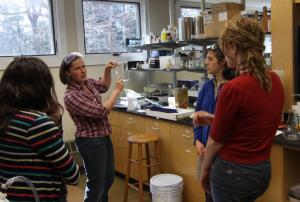
RANDY GEORGE’s Red Hen Bakery hosted the signing of Vermont’s new minimum wage bill in June, representing the small business community. “Anyone who has to buy groceries or keep a roof over their head for themselves or a family knows that these are foolish numbers,” said Randy, referring to the federal and state minimum wage of $7.25. “For myself as a business owner, if I am going to attract skilled people and keep them, we have to exceed that.” Employees at Red Hen make at least $10.50 an hour, the goal of the new state law by 2018.
’94
REBECCA WATSON MOKOS writes, “In September I started my CPE, which I didn’t do in divinity school. I’m hoping to become a hospice chaplain. Sam (10) and Lili (7) are both doing great.”
’95
LOREN TALBOT writes, “My husband Jacob and I were happy to introduce Vander Eros Storm Schuiten to the world this past November. His first “playdate” was with BRAD CARMODY’s son Hudson, who was born just one week earlier, and Auntie KIM ALLEN ’96 has been down to visit too. I have been working as the photo editor of The Week magazine for the past four years, co-chairing a poetry group in New Jersey, and loving being a mother. Old friends, drop a line if you are in the NYC area: loren@ lorentalbot.com.
“Life is good in Austin,” writes ERIK PEARSON. “My wife, Lisa, and I enjoyed visiting with DAVID WILLIAMSON ’98, ALLISON GUPTILL WILLIAMSON ’06, ALEX GREENFIELD ’97, and others. Our kids loved seeing Vermont for the first time.”
’96
JANAN COMPITELLO GUILLAUME recently got married and moved to Victor, New York.
“Returned to Portland after five-ish years in New York City and another four-and-a-half years in New Zealand, where I lived in the Wellington Region and worked for Massey University,” writes JON ROUSSEAU. “My son Liam was born in New Zealand and lays claim to three passports: U.S. from me, Philippines from his mom, and New Zealand because he was born there while we were permanent residents. I’m jealous. Liam is now attending a Mandarin language immersion program, where he just finished kindergarten. Basically, Liam’s life is the most interesting thing about my life. Would love to hear from any old friends I’ve lost contact with or any current or prospective students I could help in any way.”
ELI FISHMAN still lives on the east side of Long Island and works as the exhibit designer/builder for the Long Island Aquarium. “Having a blast watching my son grow up before my eyes, and even more excited to welcome a new addition to our family in November,” writes Eli.
’98
“Still teaching media literacy and English in failing inner city schools,” writes JOSHUA FARBER. “Acting around the edges, too. I was even nominated for a ‘Best Feature Actor’ Mass Critics Circle award for my recent turn in a dress and heels playing Edna Turnblad in a local production of Hairspray, the musical—first time I shaved the beard off since Marlboro.”
’99
“My wife Aiden, son Felix, and I continue to live in Little Compton, Rhode Island, or, as I like to call it, Vermont by the sea,” writes CHARLIE BARMONDE. “I would love to hear from any alumni in the area. I continue to work in clay and am excited that for the first time I am starting to make pure sculpture. For a little while anyway.”
“Still making places,” writes AMY DOMRAD TUDOR. “Come see us at the nonprofit Tasha Tudor Museum in Brattleboro.”
’02
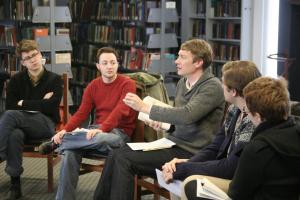
ERIN CASEY HUMAN is living in Omaha, Nebraska, with husband Mike and sons Miles and Julius. She works from home as an illustrator (humanillustrations.com), writes a blog (eisforerin.com), and is currently working on founding a new K-12 school in Nebraska, based on the Sudbury model. She is curious if any current students or alumni went to a Sudbury or democratic school before attending Marlboro…if so, be in touch: erinhuman@gmail.com.
LAUREN BEIGEL MACARTHUR writes, “Our second child, Louisa Barnes MacArthur (named with Luis Batlle in mind), was born on December 2, 2013, a true light in our world. I’m home with the kids, growing boatloads of vegetables for us and for others, and making hard cider with my husband, Jason MacArthur. We sell it locally as Whetstone Cider Works.”
“I am living in Taipei, Taiwan, for at least two years of teaching preschoolers,” writes MEGAN HAMILTON. “Spent summer 2014 traveling in Australia and to Vanuatu, in the South Pacific.”
’03
ALLISON GAMMONS writes, “I’ve been back in Oregon for about a year now, working at Testing Services at Portland State University. In the fall I will begin working on my second master’s degree, this time in history.”
’04
ELIOT GOODWIN and ALLISON LENNOX GOODWIN welcomed their second daughter, Iris Belle Goodwin, on April 4, 2014.
BRAD HECK and WILLOW O’FERAL ’07 were pleased to reach and exceed their Kickstarter goal of $20,000 to launch Arming Sisters, their documentary film following Patty Stein Stonefish’s quest to bring self-defense training to indigenous women across America. Learn more at their website.
’07
RYAN KISH received an M.F.A. from Tufts University/School of the Museum of Fine Arts, Boston in May of 2013. “I recently moved to Los Angeles and look forward to painting outside year round. I do keep in touch with Cathy, Tim, and JohnWillis. Saw them all this summer at Raf Kelman’s wedding in Vermont.”
SILVER GERETY and HEATHER GERETY ’08 write, “We, along with our three children, Ezzie (almost 5), Elspeth (3), and Josiah (a year and a half ), are moving to Zambia this year to serve with the Rafiki Foundation.We’d love to connect with anyone interested in learning more about Rafiki and our involvement. You can find Heather on Facebook, email us at heather.gerety@gmail.com, or check out the Rafiki website.
LISA MISKELLY co-runs a small Community Supported Agriculture (CSA), draft-powered vegetable farm in the Lehigh Valley of Pennsylvania with her partner Anton. “For philosophical musings grounded in the roots of farming, you can read updates about our life and work.”
’08
RENATA CHRISTEN currently works for Seed Savers Exchange, in Decorah, Iowa, a nonprofit organization dedicated to preserving America’s food and garden heritage through saving and sharing heirloom seeds. “We house the nation’s largest nongovernmental seed bank, in addition to rare White Park cattle,” writes Renata. “I am the events and outreach coordinator. Luckily, the importance of seed saving and sharing is gaining traction, as community groups begin incorporating ‘community seed projects’ into their current programming.”
THOMAS DEVITO is living in Astoria, Queens, New York, and works at Transportation Alternatives, New York City’s leading advocate for cycling, walking, and mass transit. “Since starting, I’ve been proud to assist in several big accomplishments, including ushering in the United States’ largest bikeshare system, guiding a series of major street improvement plans through to fruition, and getting street safety issues to the top of Mayor de Blasio’s agenda. I organize Manhattan-based campaigns and now know the borough better than I’ve ever known any place since cottageland. It’s exhausting, but extremely rewarding work.”
CHANNING BICKFORD is living and working in Beijing, China, where he is teaching English, report his parents.
“The anti-GMO movement prefers to cast doubt on prevailing scientific thought in order to influence both consumers and legislators—even if it means misinforming them with discredited studies,” write AARON GOODIER and JOËLLE MONTAGNINO, both employees at the Brattleboro Food Coop. In an article titled “Peace of Mind?” in The Commons, Aaron and Joëlle raise concerns about Vermont’s historic bill to mandate the labeling of GMO products: .
Kyrgyzstani Rock Stars: Lynn ’09 and Will Rowan ’08
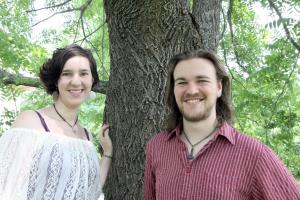 Touring has become commonplace for Lynn Mahoney Rowan and Will Thomas Rowan, who started the World Music Ensemble while at Marlboro and are now half of the vocal group called Windborne. But their tour last February was uncommon by any measure: a month in Turkmenistan, Kyrgyzstan, and Angola with the American Music Abroad program, run by the U.S. State Department’s Bureau of Educational and Cultural Affairs. Windborne was one of 10 acts chosen from 350 applicants to share American musical traditions with communities around the world, and learn from local traditions.
Touring has become commonplace for Lynn Mahoney Rowan and Will Thomas Rowan, who started the World Music Ensemble while at Marlboro and are now half of the vocal group called Windborne. But their tour last February was uncommon by any measure: a month in Turkmenistan, Kyrgyzstan, and Angola with the American Music Abroad program, run by the U.S. State Department’s Bureau of Educational and Cultural Affairs. Windborne was one of 10 acts chosen from 350 applicants to share American musical traditions with communities around the world, and learn from local traditions.
“The reason this program is so important is that it brings people from different cultures face to face with each other,” says Lynn. Windborne was a natural fit, as they sing music from all over the world, with a strong focus on American folk music. “You get to experience culture through meeting real people, not through what the media gives you, and it went both ways. What better way is there to do that than through music?”
“We were treated like rock stars,” says Will. “People were mobbing us and asking us for our autographs. We were in some areas where people had never seen someone from the United States.” Windborne played to packed houses, collaborated with the members of a local folk ensemble in Kyrgyzstan, and shared the stage with social activist musician Waldemar Bastos at a beachside concert in Luanda, Angola.
“When you are working with these musicians, and we are sharing a stage, it makes you realize that we are not so different,” says Lynn. “It’s very powerful.”
’09
EMILY KIERNAN writes, “I recently had my first novel published by a small California publisher called Unsolicited Press. Online ordering information, excerpts, etc., can be found here.”
’10
ERIN RIORDAN writes, “I’m preparing to move to Tassajara Zen Mountain Center in Carmel Valley, where I’ll sit meditating in the winter mountains and study Buddhism. I think of the Green Mountains with gratitude for Marlboro.”
Until recently, KENTON CARD was still to be found running naked on the campus trails, occasionally. He is now in California, where he works as a web researcher and writer at Architecture for Humanity’s headquarters in San Francisco. He is also a housing research fellow at Housing California, an affordable housing lobbying organization in Sacramento.
EVELYN ROSE CRAWFORD finished up her program at Case Western Reserve University for her master’s in genetic counseling in June. “I have finished up all of my coursework and my work in the clinic,” she writes. “I am scheduled to have my formal private thesis defense on June 20 and my public thesis defense on the 27th. I have accepted a position with Ambry Genetics, in California, for after I graduate, and will be moving out there in a month or so. My position consists of consulting with clinicians and writing reports for diagnostic genetic testing results. Thank you for all of your support.”
MEREDITH VITALE CANN received her master’s degree in social work, as well as a certificate in aging, from the Rutgers University School of Social Work in May 2014. In addition, she was inducted into the Phi Alpha Honor Society, the national honor society for social workers. Meredith is extremely proud of her accomplishments and greatly attributes her success to the education she received at Marlboro College. “I will continue to hone my skills as a social worker in the future, and shall always be dedicated to social justice and helping others,” writes Meredith.
’11
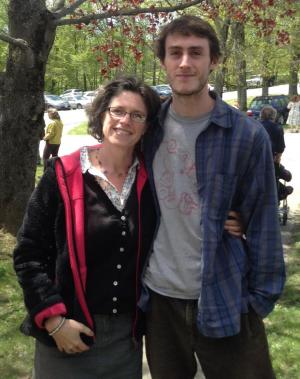
“DANIEL GARCIA-GALILI ’07 and I are taking care of a beautiful home in South Newfane and an equally wonderful cat,” writes MORGAN BROADFOOT. “Dan’s working on his master’s degree in education while I’m working on prereqs to become a physician’s assistant.We’re both active EMTs and are working toward advanced certification.”
LEVI GERSHKOWITZ is marketing director for Pearlstone Center, a conference and retreat center in the Chesapeake area. He is also teaching for a VisionWorkshops program called Crossing Borders, a youth photography program targeting immigrant and refugee teens in Baltimore.
’12
MERCEDES LAKE lives in Easthampton, Massachusetts, reports her mother, Joan. “She takes classes at Smith, and works at Urban Outfitters. You did a fine job for her at your school.”
LESLIE WILSON began as an intern at the Department of Labor, and is now the Workforce Investment Act case manager for Windham County. “My program (WIA) gives federal money to low-income individuals who wish to take a course, or need funding for anything job-related,” writes Leslie. “For instance, I am currently working with a Marlboro grad; we will be giving him approximately 600 dollars to cover teaching certification testing fees. I am also going to school part time at Dartmouth for public health.”
’13
“Life has been great,” writes EVAN LORENZEN. “I’m working as a designer/ salesperson at a phenomenal screen printing company in Denver. I currently have an art show up this month of some pretty goofy ink drawings and watercolor paintings, and was lucky enough to have a few Marlboro students drop by to check out the show. Besides that, a few weeks ago I got a lot of publicity for a series of tiny, handmade books I’ve been creating. I was lucky enough to be featured on Huffington Post, NPR’s blog, and Colossal (many thanks to Carol Hendrickson, Cathy Osman, and Linda Lemke for getting me involved in bookbinding in the first place). All in all, enjoying the sun and excitement here in the Mile High City.”
CLARE RILEY is now working for the Central Park Conservancy in New York City. “I’m working as a zone gardener, taking care of a piece of ornamental woodland in the northwestern section of the park called the Children’s Glade.”
’14
“I got a job,” writes DANIEL ZAGAL. “I’m going to be working at an organic synthesis lab making all sorts of crazy chemicals. It is a private lab in Grafton, Vermont. So on top of doing what I love doing, I get to stay in Vermont. You won’t get rid of me that easily.”
KARA HAMILTON writes, “This summer I have the wonderful opportunity to stay in southern Vermont and work as the program assistant for the master’s in TESOL program at Marlboro College. I’m looking forward to welcoming students and faculty as they arrive from all over the country and the world. I am thrilled to continue to be an active member of the Marlboro community.”
MOLLY BOOTH is working with BRIAN MOONEY ’90 as the first marketing and communications intern at Storymatic Studios, which makes creative writing prompts and games for writers and non-writers.
Graduate and Professional Studies
MAT
Over the summer, KAREN TRENOSKY MAT ’13 taught 20 teachers at Brattleboro Union High School and Brattleboro Area Middle School in a three-credit graduate class called Online Collaborative Tools. Karen is the technology integration specialist at the schools, but the class was part of a new initiative to fully integrate Google Apps for Education into the curriculum. “Our incoming freshmen are being given Chromebooks as part of a new 1:1 program,” says Karen. “I am leading the class on the adventure…very exciting!”
MSM-MDO
CASSANDRA HOLLOWAY MS ’13 recently took over as the director of the Brattleboro Area Prevention Coalition. She began working at the organization as a policy and project coordinator six months after beginning her degree program, and was promoted six months after graduating. Brattleboro Area Prevention Coalition is one of many substance abuse prevention coalitions throughout the state and the nation. Some projects of the coalition include fostering Above the Influence youth groups, addressing prescription drug misuse among youth, and reducing secondhand smoke exposure in the community. Cassandra is grateful for the education, experience, and network of colleagues that Marlboro has provided her as she begins her new professional venture.
As executive director of Meals on Wheels of Bennington County, SUSAN FOX MS ’13 has been working with the southwestern Vermont health care system to reduce the hospitalization of elders.With a grant from the Vermont Community Foundation, now in its second year, Meals on Wheels gives coupons for 10 free meals to elders being discharged or seen as having a high rate of nutritional risk. “We have been able to reduce the hospital readmission rate from 8.6 percent to 2.7 percent,” says Susan. “Unlike most meals programs that rely on processed foods, we cook everything from scratch. Over half our foods are donated from local farmers and the Vermont Foodbank.”
Former faculty
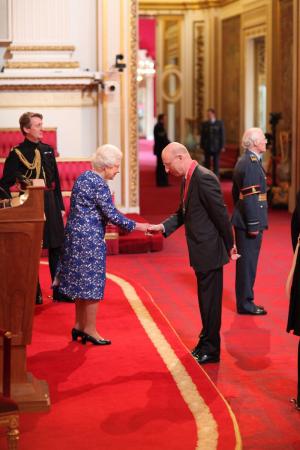
LESLIE LAMPORT, math professor at Marlboro in the ’60s, received the prestigious Association for Computing Machinery A.M. Turing Award for 2013. Leslie was recognized for imposing clear, well-defined coherence in the seemingly chaotic behavior of distributed computing systems, in which several autonomous computers communicate with each other by passing messages. Find out more.
“Making an independent film is a tightrope walk without a net, and we pulled it off. Now we’d like people to see it,” says film producer PETER LEFCOURT, who taught writing and literature at Marlboro from 1968 to 1970. He encourages readers to watch Sweet Talk, now available on various PPV and VOD platforms, from TimeWarner to iTunes. “It is about the transformative power of storytelling, among other things, and we are very proud of it,” says Peter. “Look at it this way: usually when you go to a play, you have to plunk down $25 and schlep to a theater with bad parking. Now all you have to do is press a button, part with $12 (the price of a martini), sit on your couch, and go to that special place in heaven reserved for patrons of the arts.We could use your support.”
Math fellow from 2001 to 2003, IULIANA RADU writes, “These days I am at home with my first baby, Jesse, who is almost 8 months old. That means I have very little time for the internet, but I do follow Marlboro College on Facebook and enjoy seeing the occasional updates posted there.”
